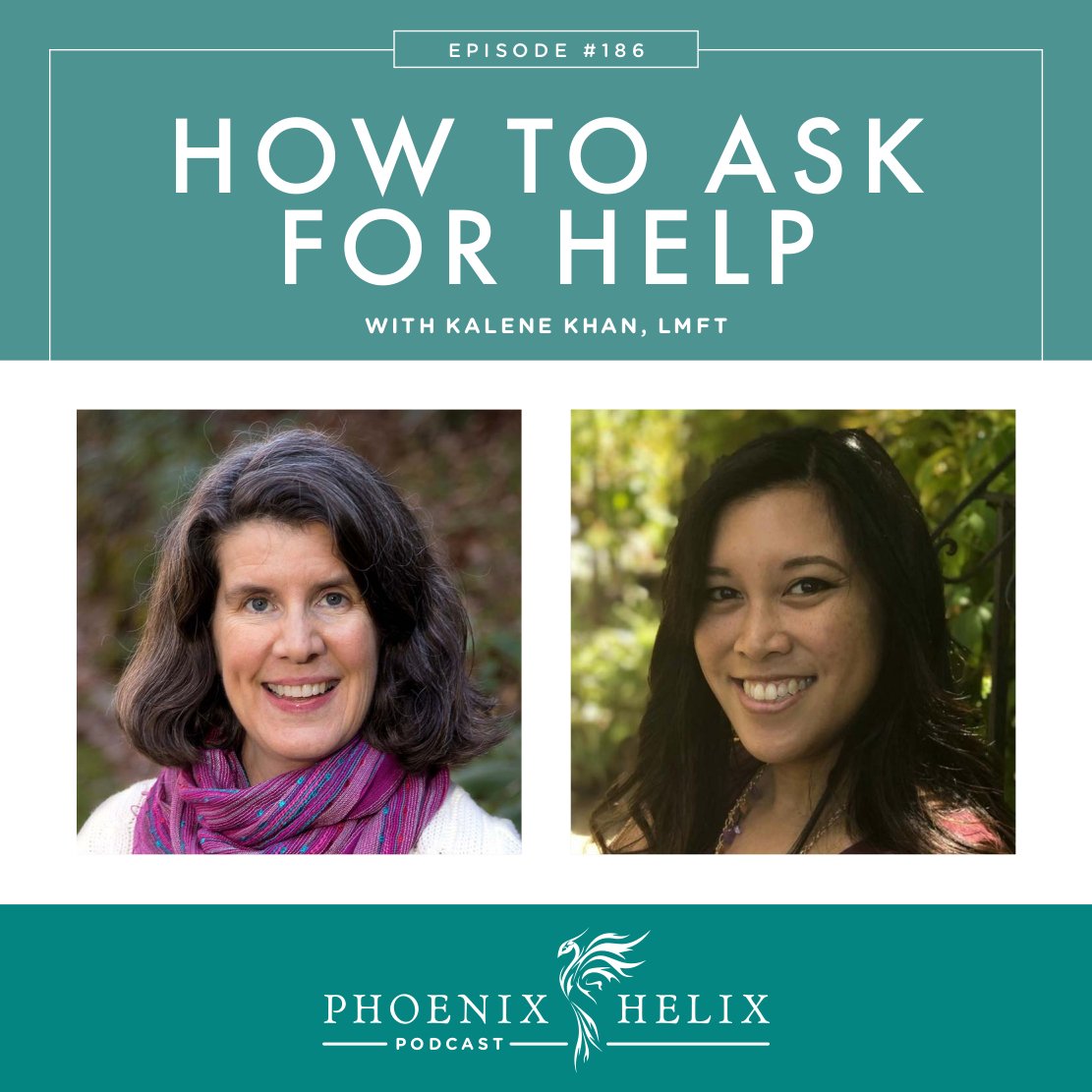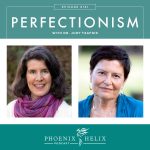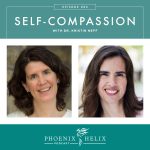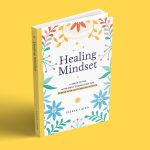Why Is Asking for Help So Hard?
Human beings depend on each other. Sometimes we give help, and sometimes we receive it, but many of us are much more comfortable in the giving role. Autoimmune disease can turn the tables quickly. Suddenly, we’re in a position where we need help more often. If we were the caregivers before, how do we navigate this change in identity? How do we face the fears that may arise – of vulnerability, feeling weak, being seen as a burden, or people saying no? If you took pride in your independence, do you feel shame if you need help? There are gifts that come with learning to receive: a deeper intimacy in relationships, a greater sense of self-compassion, a more expansive sense of identity, and a stronger connection with humanity. But that doesn’t mean it’s an easy transformation. My guest is Kalene Khan, a licensed therapist who specializes in self-compassion. She helps people learn to be as kind to themselves as they are to others. She is our guide for this conversation today.
Listen to the Show
- Subscribe to my podcast through your favorite podcast app: iTunes, Stitcher, Google, TuneIn, Spotify, Amazon, etc.
- You can also listen to the episode right here through the player below, and if you subscribe to my newsletter you’ll get notified of future episodes.
Podcast: Play in new window | Download
Show Notes
- Intro (0:00)
- Thank You to Our Podcast Sponsor – Functional Nutrition Alliance (2:12)
- Full Body Systems is their internationally acclaimed, 10-month online functional nutrition immersion training program.
- It’s designed by world-renowned educator, Andrea Nakayama. Many of you know her as one of my most popular podcast guests. Her unique way of working with patients often leads to results where other practitioners hit dead ends. This program teaches you to do the same.
- If you’re already trained as a health coach, nutritionist, or medical practitioner and want to more effectively help your clients break through healing plateaus, this class is for you!
- And if you’re an aspiring practitioner just getting started, this might be the only training you need.
- You’ll gain detailed knowledge of all the systems in the body, how they interact, how problems develop, and how to personalize diet and lifestyle recommendations for each unique client.
- Enrollment is currently open. To learn more, visit FxNutrition.com/Eileen.
- Meet Kalene Kahn (3:40)
- Kalene Khan is a licensed therapist who specializes in self-compassion. She helps people learn to be as kind to themselves as they are to others.
- She came from a family of helpers and naturally found herself in counseling roles with friends. She ended up making it her career. However, in time, she realized she often ignored her own needs. The topic of our podcast resonates with her personally. Her own journey with self-compassion is what led to it becoming a career specialty.
- What Beliefs May Underlie a Struggle to Ask for Help? (7:13)
- The beliefs are unique to each person, but they are usually rooted in some kind of self-judgment. If I ask for help, I’m….weak, selfish, needy, etc.
- Low self-worth is often hiding in the background as well. What is it that makes me feel I’m not worthy of the same kind of help I freely offer to others?
- Autoimmune disease can bring big changes to our lives and our sense of identity. Asking for help might feel like a betrayal of who we are. If we no longer feel like we having anything to give, our illness might feel like our new identity, and it’s one we don’t want.
- Asking for help is a vulnerable feeling, and vulnerability is often connected to feelings of fear and shame.
- Pride and shame are also paired emotions – if we took pride in being independent, we can feel shame in becoming dependent on others.
- Sometimes these beliefs are ones we inherited from our family, culture, or society.
- Childhood trauma can be a root cause as well – if we couldn’t trust people to care for us when we were young, it can be difficult to trust anyone to help us as adults. The skills you needed to survive may not be the same skills you need now to thrive.
- Perfectionism can underlie this struggle, too – a feeling that no one can do things as well as us. What happens when we are no longer “in charge”? Perfectionism can be a trauma response as well. In traumatic situations, there are four possible responses: fight, flight, freeze, and fawn. Fawning is trying to appease everyone around you – to do everything right and make everyone feel OK. You might have been the person in your family who needed to have everything together or bad things would happen. It’s another trait that may have served a purpose when you were young, but no longer serves you well today.
- Redefining Strength (10:10)
- The feeling of strength that comes from a fierce pride in our independence and a refusal to ask for help is actually a brittle strength – a feeling that’s easily punctured and lost.
- When we go through this journey of asking for and receiving help, and being vulnerable without judgment, a deeper, truer strength develops.
- Asking for help is a form of strength.
- Overcoming Unhelpful Beliefs (15:06)
- Since a struggle to ask for help is often rooted in self-judgment, the antidote is mindful self-compassion: paying attention with kindness.
- There are two aspects to self compassion: yin and yang. Yin self-compassion is a soft acceptance of who we are. It replaces the automatic judgmental voice with a kinder inner voice instead. There may be things we want to change about ourselves, but we can still accept who we are right now. Yang self-compassion is an empowered stance: I will no longer ignore my wants and needs. I will not allow myself to be treated unfairly. I will no longer allow my needs to go unmet.
- While formal meditation can support this practice, it’s not required. The idea is to become more present in daily life, to notice those moments that are difficult and notice when inner judgement arises – What’s wrong with you? Get over it! When you hear that voice, interrupt it and replace it with a kind voice instead. Begin by simply validating how you feel – I’m struggling. This is difficult. This hurts. The first step of asking for help is being able to see when you could use some help, and interrupt the feelings of judgment that arise with that need.
- Mindfulness and self-compassion insert a pause before our habitual automatic responses and give us the opportunity to choose differently.
- This is a practice that can slowly, bit by bit, help us overcome deeply rooted beliefs and habits and begin to make positive changes in our lives. What we practice grows stronger.
- Also beware of perfectionism creeping into your self-compassion and mindfulness practice. It’s not about being perfectly mindful and self-compassionate 24/7. It’s called “practice” for a reason. Every time you notice a judgmental thought, that’s not failure, that’s mindfulness in action, and it gives you the opportunity to be self-compassionate instead. No one is perfect at this. The goal is to simply become self-compassionate more often.
- Resource Podcasts:
- Baby Steps to Asking for Help (22:45)
- We tend to avoid the things that are difficult for us, but remember – what we practice grows stronger. So, look for small opportunities every day to ask for help. Low-risk opportunities where you will almost always get a yes. For example, if you’re given the wrong order in a restaurant or coffee shop, ask them to correct it. Request a straw or extra napkins. Ask someone for directions. At home, ask someone to pass you something at the dinner table. Or if they’re on their way to the kitchen, ask them to grab something for you, too.
- Also, practice being kind to yourself. If you’re used to self-denial, try to catch when that happens and see if there are small moments where you can choose to meet your needs instead. Kalene gave an example that she was cold when she was brushing her teeth one morning, and there was a sweater right there on the towel rack that she didn’t put on right away. Her inner voice said, “I don’t need that.” Because she was mindful, she paused and asked herself why she was denying herself comfort, and she put on the sweater.
- The more we practice asking for help in small ways (and noticing our needs), the easier it will become to ask for help when the stakes are higher. We will have experience to lean on.
- Changing Roles in Relationships (26:44)
- I’ve you’ve always been the helper, you may be surrounded by people who are used to being the receiver. This can be true in friendships, families, and the workplace. When you start asking for help, that changes the dynamic, and anytime there’s change to a existing relationship, there’s usually pushback. This is true even when the change is positive. It’s not always conscious, but people seek homeostasis in relationships (things staying the same). That doesn’t mean change isn’t possible. It simply takes effort.
- Communication is key. Let people know you’re going to start asking for help and volunteer less as “the helper”. Explain why, and this helps everyone be aware of the change, so they can respond consciously instead of unconsciously. Then, if you get pushback, you can refer to the earlier conversation and point out what’s happening. Also, reward people when they do help you – thank them. And understand they may not always be able to help, but there are respectful ways to communicate your mutual needs.
- Changing relationship dynamics takes effort on the part of both people. You’ll decide which relationships are worth that effort, and which aren’t. Some people will be willing to change with you, and some won’t.
- You may choose to let go of some of the unbalanced relationships (where you did all of the helping in the past, and the other person isn’t interested in being helpful to you now). This makes room for new, healthier relationships.
- Thank You to Our Podcast Sponsor – KC Natural (37:22)
- When you first begin the paleo autoimmune protocol, it can be pretty overwhelming. Most of your normal spices and condiments are off the table, and you’re desperately seeking flavor in the kitchen. KC Natural was created to fill that need. They started their company 6 years ago when they launched two different flavors of AIP-friendly barbecue sauce. Their company is located in Kansas City where BBQ is king! Since then, they have expanded their line to include AIP versions of ketchup, mustard, salsa, marinara sauce, and teriyaki sauce. This November, some new products are hitting their shelves: a dairy-free AIP “buttermilk-style” ranch dressing, and some AIP spice rubs.
- Healthy convenience is hard to find in the AIP community, and I’m so grateful to KC Natural for being part of it. You’ll always find KC Natural in my pantry.
- If you’d like to stock up, KC Natural has a coupon for my listeners: 15% off with the code PHOENIX15. Place your order here.
- Navigating the No’s (39:15)
- Sometimes when we ask for help, people will say yes, but other times they will say no. Part of asking for help is learning to navigate the no’s.
- Don’t judge yourself when a no hurts. It’s natural to feel rejected, even when the no is appropriate and someone has a good reason they can’t help.
- Rejection Proof is a book by Jia Jiang. To overcome his fear of being told no, the author set himself a goal to get rejected daily for 100 days. He would ask people for outrageous things where he expected them to say no, so he could get used to the feeling. He did become “rejection-proof”. He stopped taking it personally. He also learned that sometimes people say yes, even when you ask for something big.
- If feels personal when someone says no, but the no says much about them than you. All of us have a history that informs how we respond to other people, and we also have our own burdens that others may not know. If someone says no, it doesn’t mean you shouldn’t have asked. It also doesn’t mean everyone will say no to your requests for help.
- Mindfulness and self-compassion are helpful skills here. You can notice the thoughts and feelings that arise when someone says no, nurture yourself, but then choose how to go forward. Rather than ruminating on the no, you can affirm to yourself that you will continue to ask for help, even though sometimes people say no.
- Consider keeping an “Ask for Help” journal. Write down each time you ask for help, what the response was, how you felt, and how you responded. It can become part of your practice, helping you process and commit to this change. It also marks your progress over time.
- When You Have No Helpers in Your Life (46:32)
- Sometimes we think no one will help us, but when we ask enough people, we do get the help we need. However, If you truly have done this, and everyone in your life says no, that’s a very lonely feeling. Sometimes this happens if all of our relationships were unhealthy and the people in our lives aren’t interested in considering our needs. It can also happen if we’ve relocated someplace new and haven’t yet made friends.
- Remember that there are groups and organizations whose mission it is to help (government agencies, non-profit organizations, churches, etc.) See which groups in your community may be able to help you.
- While it can feel like you need good people in your life immediately, we can’t force that to happen overnight. It takes time to build relationships. It also takes time to change ourselves internally so that we can succeed in a healthy relationship. Honor your needs, and just take the first step. Seek therapy for the internal change (and to have someone supportive in your life). And externally, look beyond your need for help. Friendships can’t be built on that alone. What do you enjoy doing? What are you interests? See if there are group activities in your community where you can meet people with similar interests.
- Lastly, self-compassion can help here as well. Yin self-compassion is a gentle, nurturing acceptance of your current situation, validating that it’s hard. Yang self-compassion are the steps you take to slowly create a social and support network for yourself over time.
- Finding New Ways to Give (52:01)
- We don’t want to become 100% takers. We still want relationships where there is balance, and we support those we love. With chronic illness, the type of help and support we offer may look different now, and we may struggle to see value in what we have to give. This may be especially true during flares or periods of increased symptoms. While there are seasons of giving and receiving (it doesn’t have to be perfectly balanced every day), there’s also a broader approach to giving.
- Kalene recommends the framework of the Love Languages. These are ways that people can express love, and all five ways are beautiful. The book helps you understand the unique love language of those closest to you (their favorite way to be loved). But you can also look at all five categories for inspiration. They don’t necessarily have to be large gestures to be meaningful:
- Words of affirmation.
- Quality time.
- Acts of Service.
- Physical Touch.
- Gift Giving.
- Guided Self-Compassion Meditation (55:58)
- Guided by Kalene..
- You can find more guided meditations through Self-Compassion.org. (This is the website of Kristen Neff, who was my guest for Episode 80 of this podcast.)
- Outro (1:01:10)
- Kalene Khan has a private practice in Sacramento, California and is accepting new clients for individual and group counseling. Right now, all of her services are available online, and in 2022 she’ll offer in-person sessions as well. State licensing law requires that you live in California to access her services. She also has a blog with comics called The Overthinking Brain.
- Eileen (your podcast host) is the author of multiple books, written to help people thrive with autoimmune disease. Learn more on the Books Page.
- If you like this podcast, follow or subscribe through your favorite podcast app. You can also subscribe to Eileen’s biweekly newsletter.
- Check out the entire archive of podcast episodes.
You May Also Be Interested In
Spreading the Word
If you like the podcast, please leave a positive review in iTunes. It would mean the world to me, and also helps others find the podcast. Here are some quick instructions using your iPhone:
- If you are already subscribed to my podcast: (1) Click the purple podcast icon. (2) At the bottom of the screen, click Library. (3) At the top of the screen, click Shows. (4) Click the Phoenix Helix podcast image. (5) Scroll down the page, and you’ll see Ratings and Reviews. Scroll down a little bit more and click on Write a Review. This will bring up the review screen. Tap 5 stars (if you love the podcast), and then click in the title box, and it will bring up the keyboard. Enter a title and short review. (6) Click Send in the upper right corner. (7) Thank you! Positive reviews give the podcast a higher search ranking in iTunes, helping people find it and letting them know it’s a quality podcast and worth their time to listen.
- If you haven’t subscribed to my podcast: (1) Click the purple podcast icon. (2) In the lower right corner, click the magnifying class. (3) Type Phoenix Helix in the search box. (4) Click the podcast cover in the Show list. (5) If you’d like to subscribe, click the + sign at the top of the screen. (6) To write a review, scroll down the page, and you’ll see Ratings and Reviews. Scroll down a little bit more and click on Write a Review. This will bring up the review screen. Tap 5 stars (if you love the podcast), and then click in the title box, and it will bring up the keyboard. Enter a title and short review. (7) Click Send in the upper right corner. (8) Thank you! Positive reviews give the podcast a higher search ranking in iTunes, helping people find it and letting them know it’s a quality podcast and worth their time to listen.








